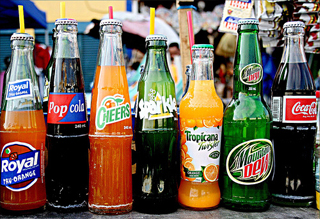We think we’re serving our bodies by eating well, exercising often, and grabbing a diet soda instead of its sugary, calorie-laden counterpart. However, are diet sodas actually helpful for your diet?
 Researchers have put this question to the test. Recent studies reported by USA Today suggests that it may not be very healthy after all to drink calorie-free, carbonated soft drinks. In fact, a recent study found that people who drink diet soda every day may be at an increased risk of stroke and heart attack over those who don’t drink soda.
Researchers have put this question to the test. Recent studies reported by USA Today suggests that it may not be very healthy after all to drink calorie-free, carbonated soft drinks. In fact, a recent study found that people who drink diet soda every day may be at an increased risk of stroke and heart attack over those who don’t drink soda.
Wait — wasn’t the whole concept of diet soda to reduce our caloric intake and therefore decrease our risk of disease?
Although the abovementioned study was simply an observational study, it should prompt us to reconsider drinking diet soda, especially if we want to reduce our waistline and maximize our health. If you’re confused about this contradicting information, you’re not alone. Once considered to be the gold standard when it came to dieting, diet sodas are now under fire for doing just the opposite.
Healthier Alternatives to Diet Soda
Some nutritionists point out that there are better drinks than diet soda when it comes to maintaining your weight, such as water, unsweetened or light sweetened tea, and coffee. They are quick to point out, however, that diet soda is still a better choice over calorie-rich drinks such as regular soda, fruit juices and fruit cocktail drinks.
One of the studies conducted about diet soda points out another potential problem: Individuals who drink diet soda are not more likely to choose unhealthier foods. For example, have you ever seen the person who orders a Big Mac, large French fries and a diet soda? You get the idea: a diet soda, when consumed with unhealthy foods, is clearly ineffective.
In other words, it’s not necessarily the diet soda that’s hurting your waistline. It’s what you choose to eat with that diet soda.
Going Overboard with Artificial Sweeteners
Some researchers urge consumers to not consider diet soda a “health food” simply because it has no calories. In particular, there are still concerns over whether the artificial sweeteners aspartame and acesulfame potassium are harmful to our health, especially when consumed daily. Also under fire is caramel coloring, which some experts say contains two cancer-causing chemicals.
Finally, amidst everything else, some recent studies have suggested that the artificial sweeteners in diet soda actually cause our sweet tooth to go into overdrive and make us crave unhealthy foods!
Making Healthy Choices
A general rule of thumb, says many experts, is to limit your intake to no more than 12 ounces of soda (diet or otherwise) a day, and instead choose water, low-fat milk tea or coffee. If you are drinking so much soda that you are eliminating other healthy drinks from your diet, such as water and milk, you are probably overdoing it. However, as part of a healthy, low-fat diet, a diet soda may be a smarter choice than other sugar-laden beverages.









